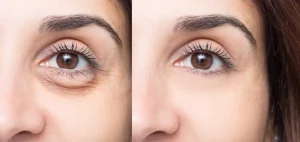At a quick glance, gummy smiles are instantly recognizable as smiles that reveal a significant portion of the upper gums. While some individuals may not be bothered by this display of gums, it is commonly perceived as aesthetically undesirable and can often lead to self-consciousness.
But what causes gums to grow over teeth and how to fix it? We will discuss it all in this blog.
What is a Gummy Smile?
A gummy smile, also known as excessive gingival display, is a cosmetic dental condition in which a person’s smile reveals an excessive amount of their gum tissue when they smile, often to the point where it can be considered aesthetically unpleasing or disproportionate. This condition occurs when the upper lip naturally rises too high, exposing a significant portion of the gums, which can make the teeth appear shorter than they actually are. Gummy smiles can vary in severity, and their causes can range from genetics and tooth development to certain underlying dental or skeletal issues. Treatment options for a gummy smile may include orthodontic procedures, gum contouring surgery, or other cosmetic dental interventions to create a more balanced and visually appealing smile.
What Makes Gum Growing Over Teeth?
Gum overgrowth, also known as gummy smile, can be caused by various factors, such as:
Medications: Some medicines, like those for seizures or to lower your immune system, can make your gums grow extensively. These medicines can mess up the usual way your gums grow and heal
Not Cleaning Mouth Well: Unhygienic practices regarding the mouth can result in the development of plaque and bacteria along the gumline. These irritants can trigger an overgrowth response from the gums.
Genes:Some individuals have a genetic predisposition to gingival overgrowth. This makes their bodies react more aggressively to certain stimuli, such as medications or inflammation.
Hormones: Hormonal changes, such as puberty, pregnancy, or menopause, can affect gum tissue. These hormonal fluctuations can make the gums more susceptible to overgrowth.
Sickness: Some diseases, like leukemia, can make your gums grow too much.
Braces or Dental Gear: In some cases, the presence of braces or other orthodontic appliances can cause gum tissue to grow over teeth. This is a less common cause but may require intervention.
Use of Tobacco: Smoking or chewing tobacco can irritate the gums and contribute to overgrowth in some individuals.
Do Overgrowth of Gums Affect Your Health?
A gummy smile, where an excessive amount of gum tissue is visible when smiling, may not necessarily pose significant risks to oral health, but it can have some potential impacts and concerns:
Looks: A gummy smile mostly affects how your smile looks. Many people don’t like it because it doesn’t look nice, and it can make them feel not confident about how they look.
Teeth Looking Short: Too much gum can make your teeth seem short and change how your smile looks.
Hard to Clean: Having lots of gum can make it tough to clean your teeth near the gums. This can lead to dirty teeth and dental problems.
Gum Problems: Depending on how bad the gummy smile is, your gums might get irritated or hurt, especially if they cover a lot of your teeth.
Feelings and Confidence: A gummy smile can affect how you feel about yourself and how you act around other people. It can make you feel less sure of yourself.
Speaking or Eating Problems: In really bad cases of too much gum, it might cause problems with how you talk or eat. But this doesn’t happen to everyone.
Treating Gum Growing Over Teeth with Botox
What is Botox?
Botox is a substance that doctors use to make certain muscles in your face relax. They inject it with a tiny needle, and it’s generally used to reduce wrinkles and lines on your skin, making you look younger. Botox offers a solution for a wide range of cosmetic issues including gummy smile, muscle spasms, headaches, and excessive sweating by temporarily stopping certain muscles from moving.
How Botox Can Treat Gummy Smiles?
Botox can be used to treat a gummy smile by temporarily relaxing the muscles responsible for lifting the upper lip excessively when smiling, which reduces the amount of gum tissue exposed. This non-surgical and minimally invasive option provides a temporary solution, typically lasting for a few months, making it a popular choice for individuals seeking to improve the appearance of their gummy smile without the need for more extensive procedures. However, Botox treatment should be administered by a qualified healthcare professional and may not be suitable for all cases, depending on the underlying cause of the gummy smile.
Conclusion
In short, a gummy smile, where your gums show a lot when you smile, can make you self-conscious. It can be caused by things like genetics, certain medications, or poor oral hygiene. Botox is a temporary, non-surgical solution to relax the muscles that cause excessive gum exposure when smiling. If you’re in NYC and want to address your gummy smile, you can consider Syra Aesthetics for this treatment to boost your smile confidence.

About The Author
Dr. Syra Hanif M.D.
Board Certified Primary Care Physician
Dr. Hanif is the Director of Aesthetic Medicine. She is a board-certified physician in Aesthetic Medicine who specializes in using non-surgical alternatives in order to enhance one's appearance through Botox and fillers.
Read More











